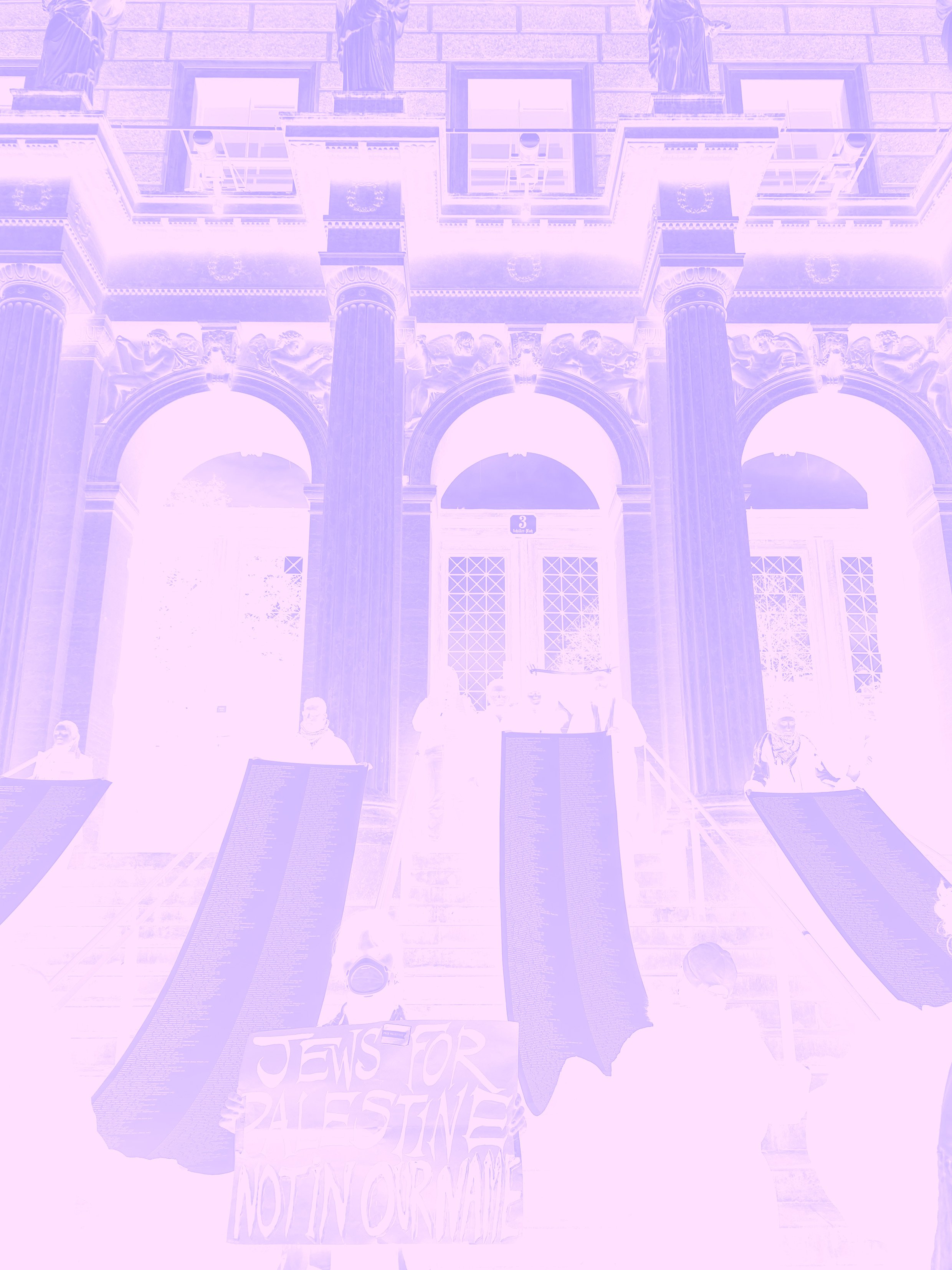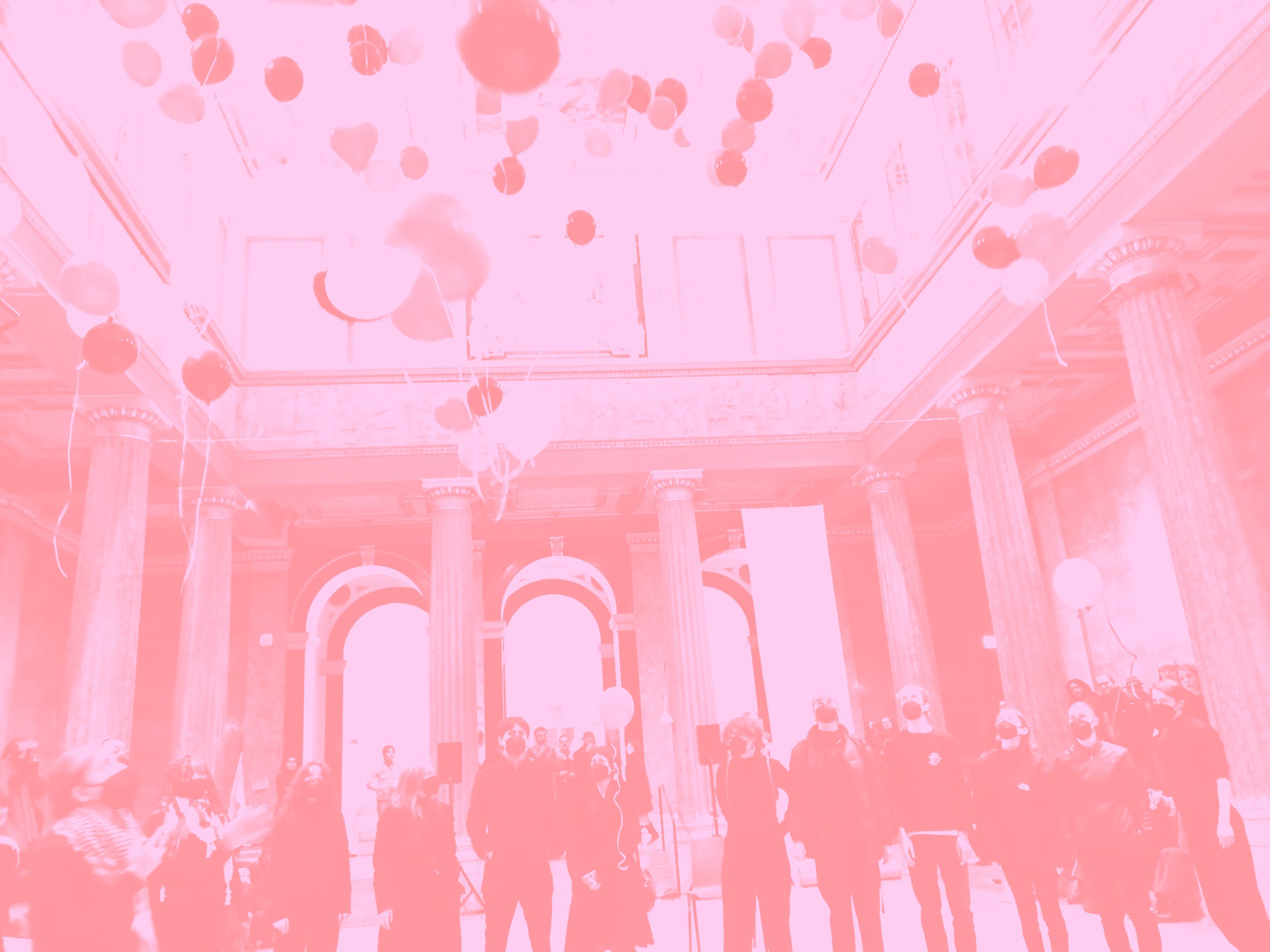ICH BIN DIESE VULGÄRE FEMINISTIN // YO SOY ESA FEMINISTA VULGAR
-by Andrea Ancira
““We will not allow Gaza to be an image of the future of the poor, racialized, oppressed, exploited and colonized people of the world.””
Since last October, the growing instrumentalization of anti-Semitism by Zionist groups around the world, including those who identify with feminisms and the anti-fascist movement, is notorious. A few months ago, in a talk entitled *Is Palestine a feminist issue? On the intertwining of (queer) feminism and anti-Semitism*, Cordula Trunk[1] argued that queer and decolonial feminist groups that have stood in solidarity with Palestinian people are informed by a "vulgar" understanding of postcolonialism that she labels as racist and anti-Semitic. Besides being a blind stance to colonial violence, the fabrication of such a narrative is a form of coloniality of knowledge insofar as the value of knowledge and understandings produced on the margins, in the East and in the Third World, is peripheral and devoid of any validity and truthfulness.
Six months before Trunk’s talk, Global Feminist Action, a network of feminist and transfeminist movements from the Global South, published the “Feminist Manifesto for Palestine,” in which they announced their commitment to Palestinian women, children and Queer people as well as their willingness to continue to articulate across borders and defend life against genocide.[2] As women*, feminists and sexual dissidents from the Global South who, in their words, “have suffered the consequences of colonization, imperialism, and the networks of influence of Capital on our bodies and territories”, this network condemned the policy of colonization and apartheid perpetrated by Israel for 75 years against Palestinian people. They also denounced the threat that the massive sale of weapons of war by the State of Israel represents for the territories and populations of the Global South, especially for those whose forms of organization and systems of knowledge do not conform to the mandates of modern Western culture.
According to the manifesto, although Israel presents itself as the only democracy in the Middle East with seemingly pro-women, pro-sexual and pro-gender diversity policies, these agendas often showcase women or LGBTQIA+ individuals in positions of power within systems that can perpetuate oppression (i.e., the emphasis on gender equality in the Israeli army). Moreover, as Walaa Alqaisiya has pointed out, Israel's homonationalism and pinkwashing are expressions of colonial violence as they impose a false duality on queer Palestinian bodies that divides the world into binaries of civilized versus uncivilized, pride versus homophobia, democracy versus terror.[3]
The Feminist Manifesto for Palestine was meant to be a global call to mobilize against the logic of state terrorism and its expressions based, as any patriarchal system, on the domination and extermination of people. However, it also made clear why, from the verge that contains and sustains the Global North, that is, from the perspective of women, lesbians, Queer people, feminists and anti-capitalists from the Global South, Palestine is indeed a feminist issue. And the reasons why it is a feminist issue are a far cry from the reasons Cordula Trunk and other Zionist feminists argue for.
Over the past year, there have been countless vigils, support groups, global actions, boycotts and demonstrations demanding the State of Israel an immediate ceasefire in Gaza (and now in Lebanon). Meanwhile, Zionist groups have been busy condemning Hamas's atrocious actions against Israeli women during the October 7 attack last year and their treatment of the hostages in its aftermath. While these statements are valid and necessary, these same people are strangely silent about Israel's equally heinous actions against Palestinian women.
This silence perpetuates a type of feminism that is complicit with colonial and imperial power structures that historically inflict harm on women and feminized subjects in the Global South under the guise of providing protection. According to Maryam Aldossari, this silence is emblematic of a “colonial feminism” in which the rhetoric of “liberating women” conceals deeper acts of violence.[4] It justifies invasions and occupations under the guise of aid, presenting women as mere victims who need to be rescued while denying their right to resist. Despite its “good” intentions, the selective empathy of liberal Western feminists serves to reinforce the power structures that continue the cycle of violence.
In Austria, the colonial feminist logic has been compounded by the effects of the Holocaust fueled by Austria’s official position of “neutrality”, institutional censorship in universities and museums, misinformation in mass media and a terrifying social silence. A silence that seems to be deeply interconnected with white supremacy and the legacies of generations of unprocessed racial violence, myths of racial, intellectual and moral superiority, and, in consequence, grief, trauma, guilt and shame. This abysmal and unacceptable silence has been contravened mainly through the voices and actions organized by migrants, BIPOC and Queer people.
Instead of enlivening solidarity with a people now targeted for genocide, the aftermath of the Holocaust has generated in several feminist and anti-fascist groups in Austria a paralyzing or blinding haze that narrows the interpretation of actions in solidarity with the Palestinian people and against the necropolitics of the State of Israel as anti-Semitic or as vulgar understandings of postcolonial and feminist theories (as illustrated by the case of Trunk’s lecture). Another example worth mentioning is that of a student at the Academy of Fine Arts, who was also involved in the organization of Trunk's talk and other events that aim to advance the Zionist narrative. This student labeled the denunciation actions that some other students were organizing at the Academy[5] as anti-Semitic. This accusation called on her family history as part of the Jewish community in Vienna. Her pain was at the center, and I could relate to her pain. However, as bell hooks suggests, talking about personal pain is not enough; our struggles can only move through and with pain if we put it in relation to the pain of others. In “The Cultural Politics of Emotions”, Sara Ahmed mentions the risk of transforming pain into an identity. According to Ahmed, the fetishization of pain separates it from the complex histories that produce it. What results from this is that my pain becomes an "immediate" measure of truth in the face of which the pain of others has no place.[6] The fetishization of pain tends to forget the place of the historical wound, that is, how I arrived at that pain or wound. Ahmed urges us to talk about pain, to learn to remember where the pain comes from, and to transformatively let ourselves be moved by our experiences of pain in order to respond to the pain of others. As she puts it succinctly: “If pain brings us together, it does so precisely because it allows us to relate affect and structure, emotion and politics in a way that undoes the separation between the individual person and others”.[7]
Decolonial and anti-colonial transfeminisms, by definition, stand against colonial state-building projects and are therefore anti-Zionist, not anti-Semitic. As Nadia Abu El-Haj has pointed out so sharply, “anti-Semitism, Islamophobia and anti-Palestinian racism are directed against people because of who they are or, perhaps more accurately, because of who they are supposed to be. As speech acts, they constitute racist and hate speech. Anti-Zionism, by contrast, is directed against a state-building project and a political regime. To equate anti-Zionism with the first three is to make a categorical mistake”.[8]
During Cordula Trunk's talk in Vienna, Tumbalacasa Ediciones along with Feministisches* Bloco Descolonial, Abya Yala Descolonial and other groups and individuals who have participated in actions in solidarity with Palestine, gathered to read the Feminist Global Action manifesto outside the hall where Trunk's talk took place. The manifesto was printed as a fanzine that was handed out to the people attending the event. The text was available in Spanish, Hindi (translation by ujjwal kanishka utkarsh), German (translation by Damijan Stranner and Sandro), and in English (translated by myself). This allowed each person to read the text in the language they felt most comfortable with. Isabel Prade designed and laid out the fanzine which was printed and assembled together by Ale Zapata and me. nicole kiruka made a stencil with the phrase “Ich bin diese vulgäre Feministin” with which we printed our t-shirts. Susana Ojeda, brought a tejido rojo (red weaving) that has been woven collectively by the Feministiches* Bloco Descolonial in different meetings. This fabric embraced us while we read together but also the reading became another occasion to continue the weaving. Besides the manifesto, we read other texts that reflected on the limits of Western and liberal feminist critique of colonial and neocolonial violence. This gesture of resistance aimed not only to set off the dominant narrative but also to make room for our own.
““We have been displaced from our territories to the Global North by a war without truce and its resulting pervasive poverty. That is why we know that children dispossessed of a future become gunmen. We, who have witnessed the growth of poverty and hunger, can see through the transparent heart of those who dream of killing themselves while killing their enemy, as part of a sick and feverish ritual of honor, as if their sacrifice would put an end to the war. But the grief, our collective mourning and desperate words have not been taken with urgency and severity by States eager for power. The outcry of the people of the world has not been enough to bring about a cease-fire. (...) We, who when the world comes to an end, sweep the floor, heal hearts, wounds and reimagine futures for the next generations, say to you: Here we are and we have always been here to remind you that we are one and the same and that our struggle for life consists in discovering the spaces where death hides, to confront them so that we do not continue to be the ones who lay the dead.””
[1] Cordula Trunk is a philosopher and cultural scientist from Leipzig who currently works at the University of Innsbruck where she is doing her Phd. She has been involved in the feminist and anti-fascist movement. This talk took place on June 5, 2024 at the University of Applied Arts and was organized by Gruppe Porquoi in cooperation with the Center for didactics for art and interdisciplinary teaching and funded by the student union of the University of Vienna.
[2] https://linktr.ee/accionglobalfeminista
[3] Walaa Alqaisiya, “Decolonial Queering: The Politics of Being Queer in Palestine. Journal of Palestine Studies, 47(3), 29–44.
[4] Maryam Aldossari, “For feminists, silence on Gaza is no longer an option” 4.01.2024 https://www.aljazeera.com/opinions/2024/1/4/for-feminists-silence-on-gaza-is-no-longer-an-option
[5] In the last year, several actions organized by student groups have taken place, among them: the action of lining the walls and windows of the academy building with images of the child victims of Israel's attacks on the civilian population in Palestine; the blockage of the entrance to the Academy building with a roll of paper on which the names of all the victims of the genocide up to that point were printed; and an action in which a group of students released balloons colored with the flag of Palestine that covered the ceiling of the Aula of the Academy of Fine Arts.
[6] Sara Ahmed, La política cultural de las emociones, 263
[7] Sara Ahmed, La política cultural de las emociones, 264
[8] Nadia Abu El Haj, Palestine is the exception to free speech and academic freedom at Barnard, 30.10.2023. https://mondoweiss.net/2023/10/palestine-is-the-exception-to-free-speech-and-academic-freedom-at-barnard/
[9] “Nosotr*s hemos sido desplazad*s desde nuestros territorios hacia el Norte Global por una guerra sin tregua y su consecuente pobreza incurable. Por eso sabemos que l*s niñ*s sin futuro se vuelven sicarios. Nosotr*s que hemos atestiguado el crecimiento de la pobreza y el hambre, podemos ver el corazón transparente de quien sueña con acabarse mientras acaba con su enemigo, como parte de un ritual de honor enfermo y febril y como si su sacrificio pusiera fin al conflicto. Pero su dolor, el duelo colectivo y nuestras palabras desesperadas no han sido entendidos con seriedad y urgencia por un mundo de Estados ávidos de poder. Los gritos de las personas del mundo no han sido motivo suficiente para el alto al fuego y la llegada de la lluvia del perdón. Nosotr*s que somos quienes, cuando el mundo acaba, barremos los platos rotos, curamos corazones y heridas y reinventamos futuros para las próximas generaciones, les decimos: Aquí estamos y hemos estado siempre para recordarles que somos un* y l* mism* y que nuestra lucha por la vida consiste en descubrir los espacios donde se esconde la muerte, para enfrentarlos y que no sigamos siendo nosotr*s quienes ponemos l*s muert*s.
Andrea Ancira (Mexico City, 1984) is an editor and curator. Her research is situated at the crossroads of archival practice, editing and translation as devices to probe memory, identity and the power structures that underpin historical narratives. Since 2017 she co-founded the feminist independent publishing house tumbalacasa ediciones. She has curated the exhibitions “Estallar las Apariencias” at Centro de la Imagen, CDMX (2018), “Réplicas: Apuntes sobre una historia material” at Ex Teresa Arte Actual, CDMX (2018), “Éclater les Apparances” at Villa Vassilieff, Paris (2019), “Escucharnos Decir” at Atrio de San Francisco, CDMX (2020), “Disorienting Plans” at Aronson Gallery, New York (2022), “Take-Away Archives” at Interference Archive, New York (2023) and “Tierra Condenada” at Spanish Cultural Center in Mexico City (2024). As a writer and researcher, she has collaborated with institutions such as Museo Universitario del Chopo, Museo Universitario de Arte Contemporáneo, Casco Art Institute, SOMA, The New School, La Escuela, Beta-Local, Pagoda Imaginaria, South as a State of Mind, CAC Brétigny, Kunstlicht, and K-Verlag. She is currently conducting her PhD research at the Academy of Fine Arts in Vienna.






